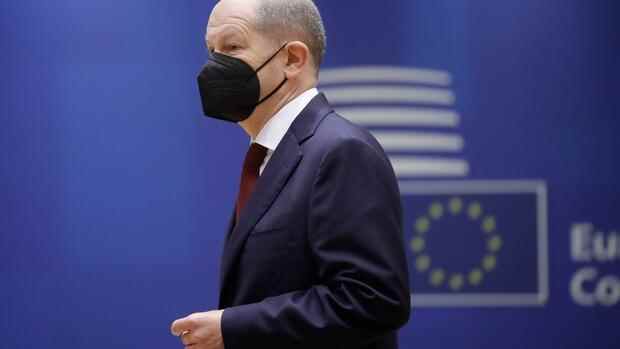The chancellor’s course is provoking more and more criticism.
(Photo: dpa)
Berlin In the debate about tougher sanctions against Russia after the attack on Ukraine, Chancellor Olaf Scholz (SPD) is coming under increasing pressure. With his no to an immediate exclusion of Russia from the banking communication network Swift, he is now largely isolated in the European Union. Austria, Italy, Cyprus and Hungary gave up their resistance one after the other on Friday and Saturday.
Even the chancellor party, the SPD, is no longer unanimously behind the head of government’s course. Juso chairwoman Jessica Rosenthal called on Saturday to use all sanctions that are available.
“This also includes the exclusion of Russia from Swift,” said the head of the SPD youth association of the German Press Agency. “We can really hurt the Russian government with this. We should meet the demands of our Eastern European partner countries here.” The Jusos make up almost a quarter of the SPD deputies in the Bundestag.
Two of the Eastern European partners, who vehemently advocate the harshest possible sanctions against Russia, made a surprise visit to Scholz on Saturday: Polish Prime Minister Mateusz Morawiecki and Lithuanian President Gitanas Nauseda flew to the Chancellery for a meeting that had been announced at short notice.
Top jobs of the day
Find the best jobs now and
be notified by email.
Commenting on the visit, Morawiecki wrote on Facebook: “I have come to rouse Germany’s conscience to finally enact truly sweeping sanctions that will influence the Kremlin’s and Putin’s decisions to stop attacking Ukraine.”
Ukrainian president calls for Russia’s Swift ban
Ukrainian President Volodymyr Zelenskyy also called on Germany to clear the way for Russia’s Swift exclusion. “There is already almost full support from EU countries to separate Russia from Swift,” he said. “I hope that Germany and Hungary will have the courage to support this decision.”
However, Hungarian Foreign Minister Peter Szijjarto made it clear on Saturday that his country is not against Russia’s Swift exclusion. On Facebook he described corresponding reports and statements as “lies”.
A comprehensive EU sanctions package came into force on Saturday night, covering the areas of energy, finance and transport as well as export controls for certain products. In addition, the assets of Russian President Vladimir Putin and Russian Foreign Minister Sergey Lavrov are to be frozen abroad.
However, the exclusion of Russia from Swift is not yet included. It is considered the sharpest sword of sanctions because it would practically cut off Russian banks from the global financial system. But it would also hit the EU economy.
More on the Ukraine war:
At the EU summit on Thursday, Germany rejected such a move. Scholz said that one still had to withhold sanctions “for a situation where it is necessary to do other things as well”. Scholz did not say what situation he means.
This Sunday, the chancellor will make a government statement on the war in Ukraine in the Bundestag. The CDU chairman Friedrich Merz spoke out on Twitter for a Swift exclusion. Even then, energy supplies from Russia could possibly still be paid for, he said. “Our high dependency on gas supplies from Russia is therefore not a viable argument against these now necessary sanctions.”
More on this: Experts fear: Russia can Swift handle cryptocurrencies
